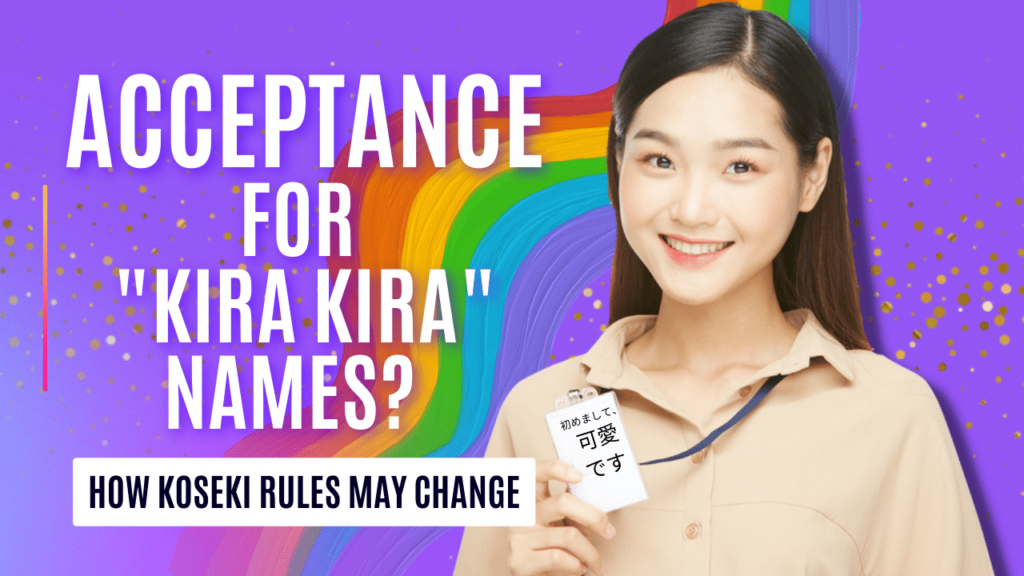[ad_1]
In an effort to streamline the digitization of koseki (family register) records, a Ministry of Justice committee proposed revisions to the Family Registration Law that would require yomigana, or phonetic readings of kanji, for family and given names. The revision would also pave the way for more inclusion of names with unusual readings, or kira kira names. [1] While the interim draft stipulates no strict rules will be added to the Family Register Act, one proposal would limit phonetic readings to those with some relation to the kanji’s meaning. For example, 大空 is typically pronounced ozora, but the English-inspired reading sukai would be acceptable since it reflects the word’s general meaning of “sky.” [1] The main reason for the proposals is to streamline digital access to family registers, but could they also streamline broader public acceptance of unusual names?

What are “Kira Kira” Names?
The trend of unusual name readings took off in the 90s with the rise and accessibility of the Internet. Because they deviated from typically acceptable names, these unusual nomenclatures were called “DQN Names,” associated with the insulting word dokyun – meaning delinquents, or less educated people. In the 2010s the media coined the term “kira kira names,” or “sparkling” names, which somewhat alleviated the trend’s negative connotation.
Kira kira names (キラキラネーム) can be divided into a few categories. They can be concepts (Beauty, 美) or pop culture references (Pikachu, 光宙). They’re also commonly ateji names where the phonetic reading has no relation to the kanji’s meaning (Maria, 真理亜). My favorite example of a kira kira name is in the manga Death Note, where the protagonist’s first name is the kanji for “moon” 月 but pronounced raito (from the English “Light”).
Nowadays, kira kira names are more commonplace regardless of socioeconomic status. Writer and kira kira name expert Ito Hiromi doesn’t think the rise of kira kira names constitutes an abuse of parental rights. Rather, it expresses a newer, nuanced interpretation of kanji and language as a whole. [2] Just as language evolves over time, so do naming conventions. In Meiji Yasuda Life Insurance company’s 2021 name ranking list, kira kira names ranked second for both boys and girls. [2] If you browse a kira kira name database, you’ll come across interesting names like Mara 麻楽, using the kanji for “marijuana” and “medicine,” and Pinku 可愛, (which would usually read Ai). [3] Like any name generator, existence doesn’t imply common usage. But it’s indicative of the many possible combinations and readings, and why some people worry these revisions will encourage harmful or embarrassing names.
The “Akuma-chan Naming Controversy” (悪魔ちゃん命騒動)
Could certain kira kira names constitute child abuse? How much should the government step in if a name threatens a child’s welfare? People raised these questions in the summer of 1993 in Tokyo when a couple submitted a birth certificate to Akishima City Hall for their son Akuma (悪魔), which means demon. The office initially accepted the certificate, since both aku and ma are joyo kanji permitted for official use in names. Later, an internal review prompted a second look. Was it really appropriate to name a child “demon?” Does this constitute an abuse of parental authority? Wouldn’t a name with largely negative connotations result in bullying and other hardships? After consulting with the Ministry of Justice, they rejected the name over concerns about the child’s future welfare.
The father filed an appeal with the Tokyo District Court. Because the Family Registration Division took some legal shortcuts removing the baby’s name without alerting the parents first, the court ruled in the father’s favor. Akishima City Hall prepared to appeal the court’s decision, the family chose to submit a new birth certificate with a similar but less polarizing name. [4] The name debacle predictably attracted scorn and called attention to the potential abuse of naming rights.

More Than Just a Name
The questions raised then are resurfacing with these proposed revisions. Even though the committee proposed that certain names with offensive connotations will be excluded if they violate or threaten a child’s welfare, online reactions appear divided. Following the announcement, a Shizuoka television program took to the streets to ask passersby to guess kira kira name readings. [5] Unsurprisingly, older generations struggled more than the younger, with the former complaining about readability.
Chugoku Shinbun received a variety of responses after asking readers over the app LINE their thoughts on the proposal. [6] Many respondents urged parents to consider the ramifications of having an unusual name. A 67-year-old man from Hiroshima glumly shared his dislike for his own name since so many people fail to read it correctly. On the other hand, a 17-year-old student expressed pride in the uniqueness of her name Mi (海), typically read as umi.
The committee plans to seek opinions from the public in late May. Given the mixed opinions voiced so far, this issue will no doubt continue to garner debate.
What to Read Next:
What’s Up With Okinawan Names? A Language History
Sources
[1] 「光宙(ぴかちゅう)」は容認「山田太郎(ドカベン)」は結論出ず キラキラネーム法務省基準案. Nikkan Sports.
[2] 「光宙」を「ピカチュウ」と読める? もはや珍しくないキラキラネームで「漢字」は「感字」に. Yahoo! Japan.
[3] DQNネーム (子供の名前@あー勘違い・子供がカワイソ).
[4] 悪魔ちゃん命名騒動. Wikipedia Japan.
[5] 「光宙」はピカチュウ…「大空」はおおぞらではなく何と読む どこまで許されるの?キラキラネーム…戸籍に「読み仮名」議論進む. Yahoo! Japan.
[6] キラキラネームは「個性的」それとも「違和感」? 読者に聞くと…. Yahoo! Japan.
[ad_2]
Source link

